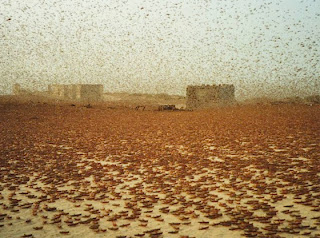The FAO press release of this past Tuesday on the organization's
locusts advisory for West Africa begins in an ominously tone:
"Croplands in Niger and Mali are at imminent risk from Desert Locust
swarms that are moving southward from Algeria and Libya, FAO warned
today."
FAO is talking about an infestation that could spawn up to 80 million
locusts per kilometer square!
This looming scourge brought to my mind the flashback of the blind
beggar character in "The Swamp Dwellers," the gripping play by
Nigerian Nobel laureate Wole Soyinka.
When it started raining on his village, the beggar recalls, after
"land had lain barren for generations," it signalled "the moment that
the village became a clan, and the clan a household, and even that was
taken by Allah in one of his large hands and kneaded together with the
clay of the earth."
"But it turned out," the beggard goes on to recount his village's
plight with a lump in his throat, "to be an act of spite. The feast
was not meant for us,--but for the locusts."
For zillions of crop-devouring locusts suddenly set upon the crops and
in their wake left the village in a far worse state of devastation and
barreness than before.
That script is being rehearsed in impoverished and war-torn Mali--and
its neighbor, Niger.
At the beginning of this past month of May, in an interview with the
Bamako daily Le Républicain, Mohamed Koité, Mali's chief
meteorologist, was upbeat about the rainfall prospects for the
2012-2013 rainy season.
Koité also revealed that there was a task force made of meteorologists
and agriculturalists who would recommend to peasants the appropriate
time to sow or plant crops in each grid of the different agricultural
zones of Mali.
Koité went on to name some of those crops that he anticipated would
obtain good yields this season: corn, peanuts, niebe, etc, as well as
the ubiquitous but much maligned cotton.
This was at least one positive news in a country (and a region) always
on the brink of famine, after a streak of bad news that succeeded one
another as if to illustrate the old saying that has it that
misfortunes never come singly.
The series of bad news started with the invasion of Mali by the
northern barbarian hordes of pro-Gaddafi Tuareg mercenaries; followed
in quick order by:
1) the military coup;
2) the proclamation of independence of the Azawad (an independence
forced upon the majority of sedentary populations in the region by
roving swarms of heavily armed desert nomad bandits);
3) the savage beating of the post-coup interim president in the
presidential palace;
4) the mass rapes perpetrated by Tuaregs and their pro-Al Qaeda allies
in territories under their control, on top of countless other acts of
malfeasance.
But unfortunately, just as in "The Swamp Dwellers," rain comes not as
a blessing but as a curse in that region.
Excerpt from the FAO advisory:
"'How many locusts there are and how far they move will depend on two
major factors--the effectiveness of current control efforts in Algeria
and Libya and upcoming rainfall in the Sahel of West Africa,' said
Keith Cressman, FAO Senior Locust Forecasting Officer."
Cressman revealed, however, an additional culprit of the looming
outbreak of desert locusts.
He told The Financial Times:
"The fall of Gaddafi was an enormous factor, to be honest... It
depleted the Libyans' capacity to monitor and respond as they normally
would."
Anyway, if those locusts were to ever swarm Kinshasa, they'd be
welcomed as manna falling from the heavens.
We eat them as deep fried delicacies.
***
PHOTO: Swarm of desert locusts in Nouakchott, Mauritania
CREDITS: FAO
Sunday, 10 June 2012
"The feast was not meant for us but for the locusts": Misfortunes never come singly in Mali
Posted on 13:06 by Unknown
Subscribe to:
Post Comments (Atom)













0 comments:
Post a Comment